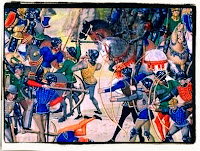Influencing: Three Reasons Why You Should be Talking with Adversaries
There are many ways in which the conversation with adversaries can help you, but there are probably three that are deal makers:
YOU LEARN MORE ABOUT THEIR VIEWS. It's easy to avoid people who appear to have goals different from your own and to avoid listening to their messages, but this hurts you more than it hurts them. By communicating with them -- or at least listening to them -- you will learn much more about their ideas, what they object to, the arguments they plan to use and so on. By knowing what kind of arguments they are going to use you can prepare a response that addresses their concerns or presents your ideas from a new perspective that they find acceptable or at least blunts their arguments.
YOU CAN FIND AREAS OF AGREEMENT. Very often your opponent really only has a problem with one part of your proposal, or maybe even just the way it is presented. Through conversation you can often learn what exactly is the problem and then adapt your proposal so that you at least neutralize their opposition or even get their support. Getting this buy in is critically important even if you have some way to impose your ideas because opponents can still sabotage the implementation later, or kill it with indifference.
YOU CAN CREATE "BIGGER PIE" SOLUTIONS: Sometimes by working with people who are apparently adversaries you can create solutions that are actually better for everybody. For example, airlines and high-speed rail operators often compete against each other, but by working together to build combined terminals they can provide a service that benefits both by allowing travelers to get quickly from a train to a plane. In this way your opponents can actually become valued partners.
An effective influencing campaign begins not with the writing of a speech, or even with the definition of the messages; it usually begins with the identification of all the players in the landscape, both friend and foe. Once you have identified all the players you can decide the appropriate communication for each, but taking great care that you have not missed anyone who could come back later to obstruct you. You will never win over people using just logic and technical superiority; the most successful people are always able to exploit their understanding of human nature and effectively manage its impact on your influencing tactics.
Related Posts on Speaking and Influencing
Selling Your Ideas Influencing Your Way To Success
Three Simple Ways to Overcome Your Fear of Speaking
Writing and Speaking Lessons from a Primatologist
Nine and a Half Tips for Presenting to C.Suite Executives
Seven and a Half Things to do When Someone Asks You to Present Their Slides
Lectures, Workshops, Coaching, Writing
For lectures, workshops and personal coaching in speaking and influencing techniques visit andrewhennigan.com, email me at speaker@andrewhennigan.com or call 0046 73 089 44 75



Comments